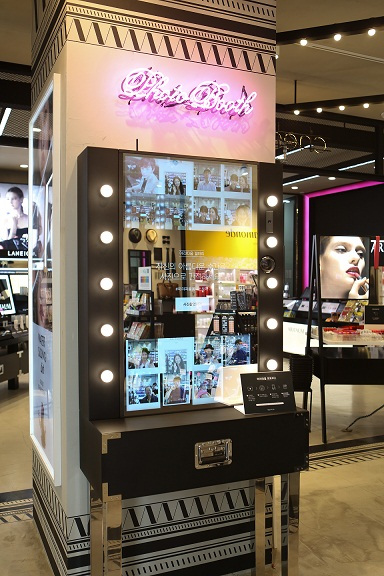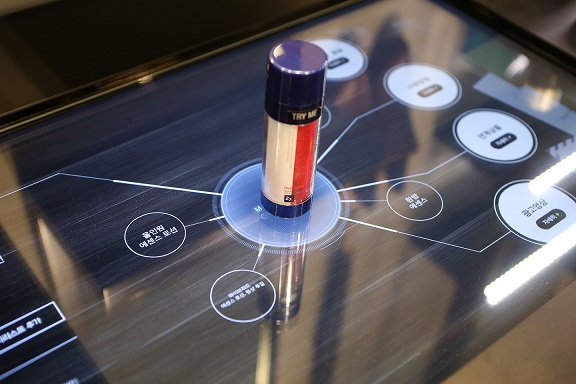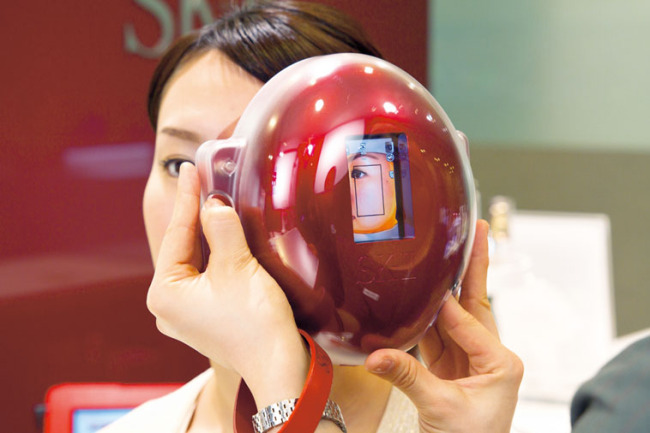Stepping inside the newly opened Aritaum flagship store near Gangnam Station in Seoul, one will encounter not only an abundance of makeup products, but also several eye-catching devices and service stations located throughout the brightly lit shop.
A corner equipped with Iope Bio Lab’s cutting-edge skin evaluation machine offers customers a detailed skin examination and consultation for free while tech-savvy “beauty mirrors” enable visitors to virtually try on diverse Laneige makeup products using a tablet linked to the brand’s mobile app.
In the hair section are scalp scanners that discerns scalp health using high-performance cameras. A tablet guides users through the examination process and prescribes the appropriate treatment and products available at the store.
 |
| A photo booth at an Aritaum “Omni-store” (AmorePacific) |
“It’s nice that I’m able to receive a free, legitimate skin checkup by skin care professionals right here without having to visit a dermatologist, and receive personal advice on my skin care needs and product recommendations,” said Kim Ye-jin, 25, who visited the store Tuesday.
Seeking to offer more interactive and tailored services to consumers, cosmetic brands in Korea are increasingly utilizing high technology and smart gadgets to satisfy diverse consumer needs at one of the largest, trend-sensitive beauty hubs in the world.
“As the world is further headed toward ‘digitalization,’ cosmetics brands will inevitably have to join such trends, given the (beauty) industry must constantly enhance communication with consumers,” said Son Hyo-joo, a merchandising analyst at HI Investment & Securities.
A visible leader headed in this direction is AmorePacific, the operator of franchise beauty store Aritaum, which has set its sights on “leading in a new era of digital-based beauty innovation” this year, as part of its 2016 business agenda.
Among other plans, the Korean beauty giant has prioritized using “omnichannel” marketing, combining online services with off-line benefits, to enhance consumers’ brand experience, which are best reflected by the tech-infused gadgets and connected services available at select Aritaum stores in Seoul.
 |
| A digital skin care bar at an Aritaum “Omni-store” (AmorePacific) |
Alongside the flagship store in Gangnam, AmorePacific operates two Aritaum “Omnistores” -- one inside Coex and another near Shinchon Station.
Inside the shops are “makeup mirrors” that determine a person’s skin tone -- warm or cool -- and recommends fitting makeup products as well as photo booths and digital “skin care bars” that offer useful product information on the spot.
By placing a product in front of the mirror, users can view its properties, effects and usage guidelines as well access real-time reviews on the Web and social media. A QR code can be scanned to add the product to a person’s purchase wish list on Aritaum.com.
“At Aritaum, we (unlike our competitors) offer not just information that the brands want to advertise, but information that customers actually want to know,” an AmorePacific spokesperson told The Korea Herald.
“By first addressing any skin-related concerns that consumers might have and offering information on what best fits their makeup needs, and later proposing fitting products for potential purchase, we are able to market our products more effectively,” she said.
The Korean beauty giant is not alone in pursuing such strategies, as a number of competing foreign cosmetic brands have embraced similar “smart gadgets” to better service Korean consumers, widely considered among the most sensitive and pickiest beauty customers in the world.
Dubbed the Magic Ring skin test, SK-II’s skin counseling service utilizes a self-developed, high-performance skin-imaging machine to examine a person’s skin in detail -- including the direction and size of wrinkles and pores -- and create a targeted regimen to address skin concerns.
 |
| SK-II’s Magic Ring counseling program (SK-II) |
“Customers are becoming more knowledgeable about skin care than ever before and more of them want extremely accurate evaluations of their skin. By equipping our stores with exclusive skin examination services, we are able to confirm our field expertise and offer a reason to visit our outlets,” said an SK-II spokesperson.
Those who visit a Dior cosmetics outlet in Korea are able to use the brand’s self-developed “shade analyzer,” shaped like a smartphone, which determines ones skin tone and recommends the appropriate foundation, powder, blush and lipstick color.
Meanwhile, France-based cosmetics giant L’Oreal Group was among the first in the industry to launch its own app, MakeUp Genius -- which several other brands have followed -- that enable customers to virtually test out the brand’s makeup products using a smartphone.
L’Oreal Korea is reportedly planning to launch a Korean version of this app in the near future, though the company said it could not comment on potential upgrades or changes to be implemented on the new app at this point.
Competing for expanded market share, cosmetics brands are geared to continue to take advantage of the latest technologies to more effectively reach out to Korean consumers and differentiate their services from others in the years to come.
“We believe tech-based, interactive services for consumers will continue to expand, as brands seek to service young customers who are sensitive to the latest makeup trends and address diverging consumer needs,” said the AmorePacific spokesperson.
South Korea’s cosmetics market is currently valued at an estimated 10 trillion won ($8.25 billion). Though future growth will mostly be led by local duty-free sales and exports to China, the domestic segment is expected to grow by around 5 percent, according to Son.

